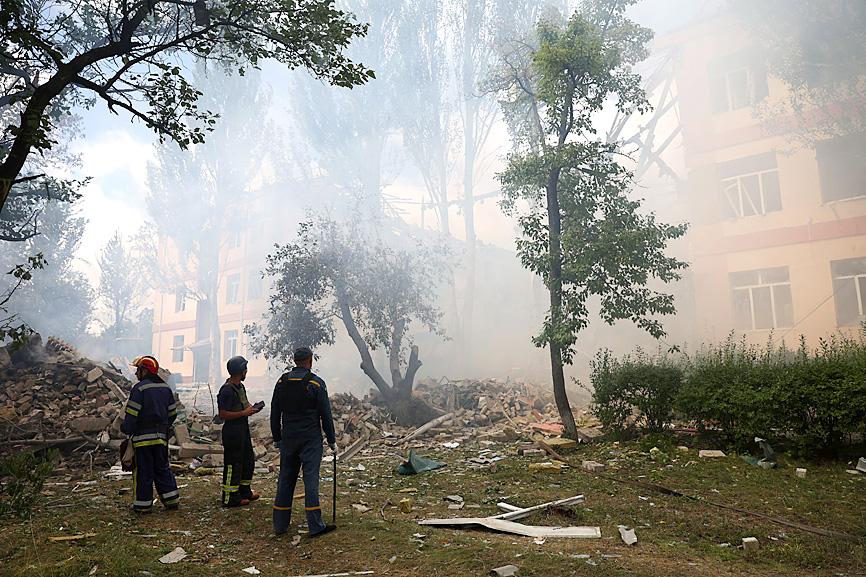Russian artillery strikes yesterday pounded Kharkiv, Ukraine’s second-largest city, after Moscow announced it was expanding its war aims, even as Russian gas flows to Europe resumed through the Nord Stream pipeline.
The attacks on the eastern city — scarred by weeks of Russian shelling — came after 10 days of scheduled work ended on the Nord Stream gas pipeline that had spurred fears of a permanent cutoff.
Kharkiv’s regional governor said two people were killed and 19 injured, four of whom were in a serious condition.

Photo: AFP
Three people were killed by strikes a day earlier in Kharkiv, where some semblance of normal life had returned in the past few weeks after Ukrainian forces pushed back Russian troops from the city limits.
“We are asking Kharkiv residents to be extremely careful. The enemy is firing chaotically and brutally at the city. Stay in shelters!” Kharkiv Oblast Governor Oleh Synyehubov wrote on social media.
Ukrainian presidential adviser Mykhaylo Podolyak said there was also some damage on a mosque in Kharkiv, accusing Russia of “contempt” after Russian President Vladimir Putin’s visit to Iran this week.
In Kramatorsk in the Donbas region of eastern Ukraine, which has seen some of the fiercest fighting, a school that Ukrainian officials said was being used as a food aid storage point was also struck.
“I have been working at this school for 16 years. It was my home,” the school’s deputy director Olena Shmadchenko, 56, said.
Russian troops invaded Ukraine on Feb. 24 and the war has left thousands dead, forced millions to flee their homes and wrought havoc with the economy.
Ukraine’s central bank yesterday said it was devaluing the hryvnia by 25 percent.
“The new hryvnia rate will become an anchor for the economy and will add its resilience in conditions of uncertainty,” the bank said in a statement.
Meanwhile, the resumption of gas supplies from Russia to Europe through Germany came a day after Europe unveiled emergency measures to circumvent Russian energy “blackmail.”
In its latest package of penalties on Wednesday, the EU targeted gold exports and froze assets at Russia’s largest bank Sberbank.
The German government had been worried Moscow would not reopen the taps on the Nord Stream pipeline after Russia in the past few months severely curbed flows in retaliation against sanctions.
“It’s working,” a Nord Stream spokesman said yesterday, without specifying the amount of gas being delivered.

A magnitude 7.0 earthquake struck off Yilan at 11:05pm yesterday, the Central Weather Administration (CWA) said. The epicenter was located at sea, about 32.3km east of Yilan County Hall, at a depth of 72.8km, CWA data showed There were no immediate reports of damage. The intensity of the quake, which gauges the actual effect of a seismic event, measured 4 in Yilan County area on Taiwan’s seven-tier intensity scale, the data showed. It measured 4 in other parts of eastern, northern and central Taiwan as well as Tainan, and 3 in Kaohsiung and Pingtung County, and 2 in Lienchiang and Penghu counties and 1

FOREIGN INTERFERENCE: Beijing would likely intensify public opinion warfare in next year’s local elections to prevent Lai from getting re-elected, the ‘Yomiuri Shimbun’ said Internal documents from a Chinese artificial intelligence (AI) company indicated that China has been using the technology to intervene in foreign elections, including propaganda targeting Taiwan’s local elections next year and presidential elections in 2028, a Japanese newspaper reported yesterday. The Institute of National Security of Vanderbilt University obtained nearly 400 pages of documents from GoLaxy, a company with ties to the Chinese government, and found evidence that it had apparently deployed sophisticated, AI-driven propaganda campaigns in Hong Kong and Taiwan to shape public opinion, the Yomiuri Shimbun reported. GoLaxy provides insights, situation analysis and public opinion-shaping technology by conducting network surveillance

‘POLITICAL GAME’: DPP lawmakers said the motion would not meet the legislative threshold needed, and accused the KMT and the TPP of trivializing the Constitution The Legislative Yuan yesterday approved a motion to initiate impeachment proceedings against President William Lai (賴清德), saying he had undermined Taiwan’s constitutional order and democracy. The motion was approved 61-50 by lawmakers from the main opposition Chinese Nationalist Party (KMT) and the smaller Taiwan People’s Party (TPP), who together hold a legislative majority. Under the motion, a roll call vote for impeachment would be held on May 19 next year, after various hearings are held and Lai is given the chance to defend himself. The move came after Lai on Monday last week did not promulgate an amendment passed by the legislature that

Taiwan is gearing up to celebrate the New Year at events across the country, headlined by the annual countdown and Taipei 101 fireworks display at midnight. Many of the events are to be livesteamed online. See below for lineups and links: Taipei Taipei’s New Year’s Party 2026 is to begin at 7pm and run until 1am, with the theme “Sailing to the Future.” South Korean girl group KARA is headlining the concert at Taipei City Hall Plaza, with additional performances by Amber An (安心亞), Nick Chou (周湯豪), hip-hop trio Nine One One (玖壹壹), Bii (畢書盡), girl group Genblue (幻藍小熊) and more. The festivities are to